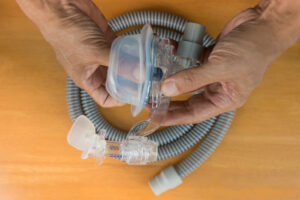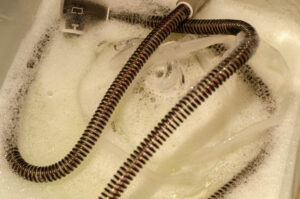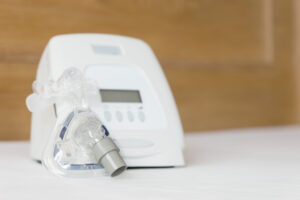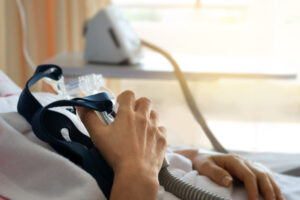Continuous positive airway pressure therapy, or CPAP therapy, is an effective treatment for snoring and sleep apnea. Bilevel positive airway pressure therapy adds another degree of sophistication to this proven approach to nighttime breathing disorders. By providing two different levels of pressure that correspond to the inhalation and exhalation of breathing, BiPAP therapy has been found to be more comfortable to use than CPAP machines. However, the maintenance of CPAP and BiPAP machines is almost identical, and should be done regularly, regardless of which type of therapy you use. The facemask, tubing, and even the bedside CPAP or BiPAP machines themselves should be cleaned regularly. BiPAP cleaning can be simple and straightforward.
Where to Clean a BiPAP
A BiPAP machine or CPAP machine has a number of components that should be cleaned regularly. The mask or nose plugs and mouthpiece should be cleaned as often as you would clean anything you kept against your mouth and nose for long periods of time, perhaps daily. The plastic or rubber lining can begin to accumulate oils and dead skin cells over time, providing a perfect environment for bacteria to thrive.
The hose that connects the face mask or nose plugs and mouthpiece can also foster bacteria and other microbes. The tube may be filled with warm, moist air from exhaled breath or from a humification stage. Any BiPAP cleaning practices should include the air hose or tube. There are special BiPAP and CPAP hose cleaners that can help you do this.
If your BiPAP or CPAP machine has a humidification stage, the water reservoir also needs to be cleaned regularly. Whether the humidifier is built in or separate from the BiPAP or CPAP device does not matter when it comes to cleaning. The wet environment is perfect for harmful bacteria.
How to Clean Your BiPAP
Follow your BiPAP or CPAP machine manufacturer’s guidelines when cleaning by hand. The plastics and rubber materials of the hose and the sensitive electronics of the machine itself may be damaged by some cleaners. Also keep in mind that when using a harsh smelling chemical like chlorine bleach, it will take some time for the smell to dissipate. Instead of cleaning right before bed, try cleaning in the morning to give the smells a chance to diffuse. To avoid a harsh chlorine smell, consider using scentless oxygen cleaners. CPAP supply stores may sell specially formulated cleaning products for CPAP and BiPAP cleaning.
There are a number of specially designed machines to clean CPAP and BiPAP machines. An automatic cleaner for CPAP machines and BiPAP machines can eliminate some of the repetitive chores that BiPAP cleaning may entail.
A water-free and scent-free method is to use an ozone machine or ozone cleaner. An ozone cleaner for CPAP and BiPAP devices uses an ozone machine to create activated oxygen for ozone disinfection. Some ozone CPAP cleaners, which work equally well for BiPAP cleaning, are small enough to be portable. A portable CPAP cleaner or portable BiPAP cleaner means that you can bring your positive airway pressure machine with you when you travel and be able to keep it fresh and clean.
BiPAP Cleaning FAQs
It depends on the design of the BiPAP machine. Some bilevel positive airway pressure machines have an integrated humidifier that adds a small amount of humidity to the air. This helps prevent excessive drying of the airways, which is a common side effect of CPAP therapy and BiPAP therapy. If the BiPAP or CPAP machine doesn’t have an integrated humidifier, then the machine actually doesn’t need water in any way to operate correctly. Some BiPAP and CPAP machines with integrated humidifiers actually allow the humidification stage to be turned off, in which case water would not be needed for operation. However, if you want to have the humidifier running while using a BiPAP or CPAP machine with an integrated humidification stage, then water is required.
It can be very difficult to point to a single cause of a stroke, but the conditions that increase the likelihood of stroke are well-known. Obstructive sleep apnea is known to be a serious risk factor for having a stroke.
Ideally you should follow manufacturer’s guidelines for how often to clean your positive airway pressure machine, whether it be BiPAP or CPAP. If this seems unmanageable, then less frequent cleaning is better than no cleaning at all. The possibly dire complications from obstructive sleep apnea makes halting BiPAP or CPAP usage because of an unmanageable cleaning schedule potentially dangerous.
One of the major reasons sleep apnea makes you tired is because it disrupts your sleep. When humans sleep, there are four different stages of sleep, starting with a very light sleep and progressing to deep sleep. Every stage of sleep is important for health, but the two deepest stages are very important for feeling rested the next day. When someone briefly stops breathing due to sleep apnea, they temporarily leave the deepest stages of sleep. As a result, less time is spent in the stages of sleep that are critical to feeling rested and restored.
References
Ask the Sleep Doctor
Have questions about sleep? Submit them here! We use your questions to help us decide topics for future articles, videos, and newsletters. We try to answer as many questions as possible. You can also send us an email. Please note, we cannot provide specific medical advice, and always recommend you contact your doctor for any medical matters.










